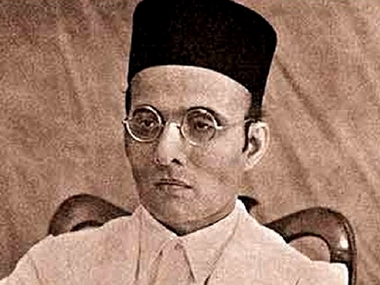“India cannot be assumed today to be a unitarian and homogeneous nation, but on the contrary there are two nations in the main; the Hindus and the Moslems, in India.” (Samagra Savarkar Vadmay- Volume 6, Maharashtra Prantik Hindusabha Publication, 1963-65, Page 296) Savarkar made the above statement in his presidential address at the All India Hindu Mahasabha convention in Karnavati (Ahmedabad) in 1937. From this one sentence, it is alleged, without any basis, that he proposed or advocated the two-nation theory, and that Jinnah sought Partition as a means to implement these principles. As a matter of fact, immediately after the above statement, Savarkar had said, “And as it has happened in many countries under similar situation in the world, the utmost that we can do under the circumstances is to form an Indian State in which none is allowed any special weightage of representation and none is paid an extra price to buy his loyalty to the State….. The Hindus as a nation are willing to discharge their duty to a common Indian State on equal footing.” (ibid, Page 296). [caption id=“attachment_6628131” align=“alignleft” width=“380”]  File image of Vinayak Damodar Savarkar. News18[/caption] Finally, Savarkar says, “We shall ever guarantee protection to the religion, culture and language of the minorities for themselves, but we shall no longer tolerate any aggression on their part on the equal liberty of the Hindus to guard their religion, culture and language as well. If the non-Hindu minorities are to be protected then surely the Hindu majority also must be protected against any aggressive minority in India.”(ibid, Page 298). If Savarkar had approved of the two-nation theory, would he have said, “We shall ever guarantee protection to the religion, culture and language of the minorities?” It is equally unlikely that he would said that no one would be allowed special weightage or representation or that the “Hindus as a nation are willing to discharge their duty to a common Indian State on equal footing.” Most importantly, before rendering above statement, Savarkar had said, " As it is, there are two antagonistic nations living side by side in India. Several infantile politicians commit the serious mistake in supposing that India is already welded into a harmonious nation, or that it could be welded thus for the mere wish to do so. These our well-meaning but unthinking friends take their dreams for realities….. But the solid fact is that the so-called communal questions are but a legacy handed down to us by centuries of a cultural, religious and national antagonism between the Hindus and the Moslems. When time is ripe you can solve them; but you cannot suppress them by merely refusing recognition of them.”(ibid, Page 296). We must note that Savarkar was a realist. Therefore, when he spoke about there being two nations of Hindus and Muslims in India, he was expressing an unpleasant truth; a bitter reality. A solution can only be found when one accepts the reality. To this end, Savarkar had said, “It is safer to diagnose and treat deep-seated disease than to ignore it. Let us bravely face unpleasant facts as they are.” This part of his speech was criticised even while Savarkar was alive. Therefore, Savarkar clarified his statement to journalists on 15 August, 1943 in the office of the Marathi weekly Aadesh published from Nagpur. He also clarified his position in an interview given in Mumbai on 23 August, 1943. In the interview, he said, “People still do not understand the important thing that stating the fact of Mussulman and Hindu nations being present in Hindusthan is not to accept the Pakistani adamancy of carving a country of the Mussalmans….. While two or two hundred nations that consider themselves separate from the Hindus have presently entered Hindusthan by force and are demanding Partition of Hindusthan, it is not by a woolly-headed and cowardly denial of this fact but rather by understanding, facing and changing it shall an independent, undivided and indivisible Hindu nation alone shall without doubt, remain in Hindusthan. But as in our history when the Hindu Nation successfully rallied under the Hindu Flag, the Hindus should come forward and rise unitedly…..We should not confuse between nation and state. Even if the state goes, the nation remains. When the Mussulmans were ruling over us, the government (state) was theirs. But the existence of the Hindus was most certainly intact. Even so, there is no problem in a common state of Hindus and Mussulmans. In the past, we had nations (Rashtra) such as Maharashtra, Saurashtra, Devrashtra (near Berar). Where are these nations? They mingled with each other. The Shakas and Huns came to Hindusthan as nations. But what is the evidence of their existence today? We digested them. So if the Mussulmans want, they could amicably stay with Hindus as a minority community …. In the end, desire is the most influential and important factor for a nation.” Through this, Savarkar merely made a statement of fact, and was not advocating for such a situation.
“India cannot be assumed today to be a unitarian and homogeneous nation, but on the contrary there are two nations in the main; the Hindus and the Moslems, in India.” (Samagra Savarkar Vadmay- Volume 6, Maharashtra Prantik Hindusabha Publication, 1963-65, Page 296) Savarkar made the above statement in his presidential address at the All India Hindu Mahasabha convention in Karnavati (Ahmedabad) in 1937. From this one sentence, it is alleged, without any basis, that he proposed or advocated the two-nation theory, and that Jinnah sought Partition as a means to implement these principles.
Advertisement
End of Article


)

)
)
)
)
)
)
)
)



